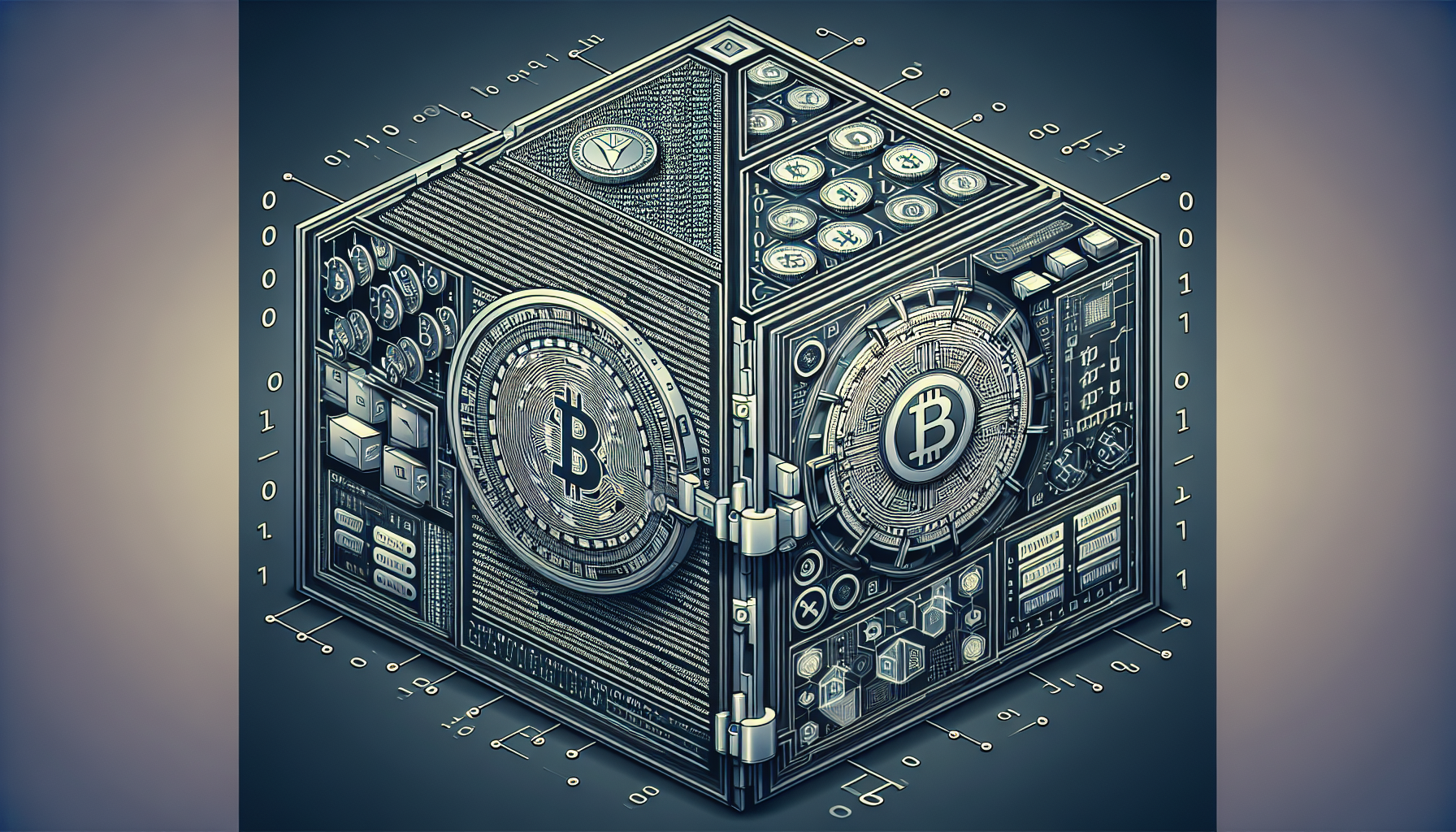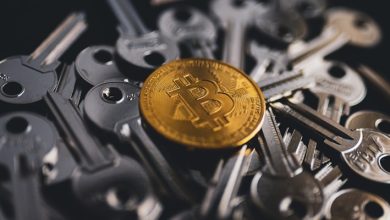How to Safely Store Your Cryptocurrency”

- Understanding the importance of secure storage for your cryptocurrency
- Best practices for storing your cryptocurrency safely
- Choosing the right wallet for your digital assets
- Protecting your private keys from potential threats
- Offline vs. online storage: which is the safer option?
- Tips for creating a strong and unique password for your crypto wallet
Understanding the importance of secure storage for your cryptocurrency
Understanding the significance of **secure storage** for your **cryptocurrency** is crucial in ensuring the safety of your digital assets. With the rise of **cybersecurity** threats and **hacking** incidents targeting **cryptocurrency** holders, it is essential to take proactive measures to protect your investments.
By utilizing **secure storage** solutions such as **hardware wallets**, **paper wallets**, or **cold storage**, you can significantly reduce the risk of **cyber attacks** and unauthorized access to your **cryptocurrency**. These **secure storage** options provide an added layer of protection by keeping your **private keys** offline and out of reach from **hackers**.
When choosing a **secure storage** solution for your **cryptocurrency**, it is important to consider factors such as **reliability**, **ease of use**, and **security features**. **Hardware wallets** are often recommended for their **secure** and user-friendly design, making them an ideal choice for **long-term storage** of **cryptocurrency**.
Overall, prioritizing **secure storage** for your **cryptocurrency** holdings is essential in safeguarding your investments and protecting them from **cyber threats**. By taking the necessary precautions and investing in **secure storage** solutions, you can have peace of mind knowing that your **digital assets** are safe and secure.
Best practices for storing your cryptocurrency safely
When it comes to storing your cryptocurrency, it is crucial to follow best practices to ensure the security of your digital assets. Here are some tips to help you keep your cryptocurrency safe:
- Use a hardware wallet: Hardware wallets are considered one of the safest ways to store cryptocurrency. These physical devices store your private keys offline, making them less vulnerable to hacking.
- Enable two-factor authentication: Adding an extra layer of security to your cryptocurrency accounts with two-factor authentication can help prevent unauthorized access.
- Backup your wallet: Make sure to regularly backup your wallet and store the backup in a secure location. This will help you recover your funds in case your device is lost or damaged.
- Keep your software up to date: Always update your wallet software and operating system to protect against potential security vulnerabilities.
- Avoid public Wi-Fi: When accessing your cryptocurrency accounts, avoid using public Wi-Fi networks as they can be insecure and prone to hacking.
- Use strong passwords: Create complex passwords for your cryptocurrency accounts and consider using a password manager to securely store them.
By following these best practices, you can help safeguard your cryptocurrency investments and minimize the risk of theft or loss. Remember, it is essential to stay vigilant and proactive when it comes to protecting your digital assets.
Choosing the right wallet for your digital assets
When it comes to safeguarding your digital assets, choosing the right wallet is crucial. There are several types of wallets available, each with its own set of features and security measures. It’s essential to consider factors such as security, convenience, and ease of use when selecting a wallet for your cryptocurrency.
One option is a hardware wallet, which is considered one of the most secure ways to store cryptocurrency. These wallets store your private keys offline, making them less vulnerable to hacking or cyber attacks. While hardware wallets may come at a higher cost compared to other types of wallets, the added security they provide is well worth the investment.
Another popular choice is a software wallet, which can be either desktop-based or mobile-based. These wallets are convenient and easy to use, making them a great option for beginners. However, they are more susceptible to security breaches compared to hardware wallets. It’s essential to choose a reputable software wallet provider to ensure the safety of your digital assets.
For those looking for a balance between security and convenience, a web-based wallet may be the right choice. These wallets are accessible from any device with an internet connection, making them ideal for users who need to access their cryptocurrency on the go. However, web-based wallets are more vulnerable to hacking compared to hardware wallets.
Ultimately, the best wallet for your digital assets will depend on your individual needs and preferences. It’s essential to research different wallet options and choose one that offers the right balance of security and convenience for you. By taking the time to select the right wallet, you can ensure that your cryptocurrency is stored safely and securely.
Protecting your private keys from potential threats
When it comes to safeguarding your cryptocurrency, protecting your private keys is crucial. Private keys are essentially the passwords that grant you access to your digital assets. If they fall into the wrong hands, your funds could be at risk. Here are some tips to help you keep your private keys safe from potential threats:
- Use a hardware wallet: Hardware wallets are considered one of the most secure ways to store your private keys. These physical devices store your keys offline, making them less vulnerable to hacking attempts.
- Avoid storing keys on your computer: Keeping your private keys on your computer exposes them to online threats such as malware and phishing attacks. Consider storing them on a separate device or using a paper wallet instead.
- Enable two-factor authentication: Adding an extra layer of security to your accounts with two-factor authentication can help prevent unauthorized access to your private keys.
- Keep backups in a secure location: It’s important to have backups of your private keys in case you lose access to your primary storage. However, make sure to store these backups in a secure location, such as a safe deposit box or a locked drawer.
- Be cautious with online activity: Be wary of phishing emails, suspicious websites, and other online threats that could compromise your private keys. Always double-check the legitimacy of websites and sources before entering your private key information.
By following these tips and staying vigilant, you can help protect your private keys from potential threats and keep your cryptocurrency safe and secure.
Offline vs. online storage: which is the safer option?
When it comes to storing your cryptocurrency, one of the key decisions you’ll need to make is whether to use offline or online storage. Both options have their own set of advantages and disadvantages, so it’s important to weigh them carefully before making a decision.
Offline storage, also known as cold storage, involves keeping your cryptocurrency in a physical form that is not connected to the internet. This can include hardware wallets, paper wallets, or even storing your private keys in a safe deposit box. One of the main benefits of offline storage is that it is generally considered to be more secure than online storage. Since your cryptocurrency is not connected to the internet, it is less vulnerable to hacking or cyber attacks.
On the other hand, online storage, also known as hot storage, involves keeping your cryptocurrency in a digital form that is connected to the internet. This can include using online wallets, exchanges, or other third-party services to store your cryptocurrency. While online storage is generally more convenient and easier to access, it is also more vulnerable to security breaches. Hackers can potentially gain access to your cryptocurrency if they are able to breach the security measures of the online storage provider.
In conclusion, both offline and online storage options have their own pros and cons when it comes to storing your cryptocurrency safely. It’s important to carefully consider your own security needs and preferences before deciding which option is right for you. Ultimately, the safest option may be to use a combination of both offline and online storage methods to ensure the security of your cryptocurrency holdings.
Tips for creating a strong and unique password for your crypto wallet
When it comes to safeguarding your cryptocurrency, creating a strong and unique password for your crypto wallet is crucial. Here are some tips to help you enhance the security of your digital assets:
- Use a combination of uppercase and lowercase letters, numbers, and special characters to make your password more complex and difficult to crack.
- Avoid using easily guessable information such as your name, birthdate, or common words as part of your password.
- Make sure your password is at least 12 characters long to increase its strength and resilience against hacking attempts.
- Consider using a passphrase instead of a single word to add an extra layer of security to your crypto wallet.
- Regularly update your password to minimize the risk of unauthorized access to your cryptocurrency holdings.
By following these guidelines, you can significantly reduce the chances of falling victim to cyber attacks and keep your digital assets safe and secure.





I’ve been storing my cryptocurrency for years now, and I can’t stress enough the importance of using hardware wallets. They provide an extra layer of security that gives me peace of mind. This article does a great job of explaining the different storage options available and the best practices to keep your investments safe.
I recently got into cryptocurrency and was overwhelmed by the options for storage. This article helped me understand the importance of not keeping all my coins on exchanges and the risks involved. I’ve since moved my assets to a hardware wallet and feel much more secure knowing my investments are safe.
As someone who has experienced the loss of cryptocurrency due to improper storage, I can’t stress enough how crucial it is to educate yourself on the best practices. This article provides valuable insights into the different storage methods and the steps to take to ensure your funds are protected. I wish I had come across this information sooner.
I’ve always been fascinated by the world of cryptocurrency, but I never realized the importance of secure storage until I read this article. The tips on using cold storage and multi-signature wallets were eye-opening for me. It’s reassuring to know that there are ways to safeguard my investments in this volatile market.
I’ve been storing my cryptocurrency for years now, and I can’t stress enough the importance of using hardware wallets for added security. It’s crucial to keep your private keys offline and away from potential hackers. This article provides great tips on how to safely store your digital assets, and I highly recommend following them to protect your investments.
As a beginner in the world of cryptocurrency, I found this article extremely helpful in understanding the various storage options available. I was initially overwhelmed by the technical aspects of securing my digital assets, but the step-by-step guide provided here made it much more manageable. I appreciate the emphasis on backup strategies and the importance of keeping your information secure. Thank you for shedding light on this crucial aspect of crypto ownership.